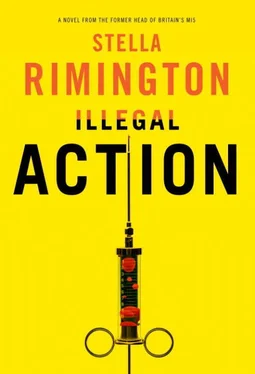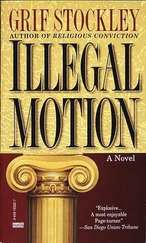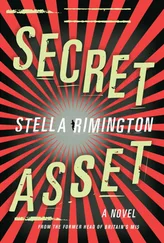“Elizabeth,” he said, standing up and coming out from behind his large desk to shake her hand. He motioned her to sit on the sofa on the other side of the room and himself took the armchair opposite. “How very nice to see you.”
She declined tea or coffee while he made small talk. “Congratulations on your new position,” he said. “I hope you’re enjoying it.”
“I am, thank you,” she replied, “though it’s only a lateral move.”
“I wouldn’t be so sure,” he protested, then stopped. He’d always sensed the resolute independence that accompanied her unflappable, professional façade. The last thing to do was to patronise her. “I was sorry to hear about Charles’s situation,” he said, changing the subject. “It must be grim for him.”
“Yes,” she said simply, gazing back at him with a level expression.
He changed tack. “How’s that young woman getting on?” he asked. “I wasn’t very happy to lose her, you know.”
Liz acknowledged this with the faintest hint of a smile. “Peggy’s been transferred to Counter-Espionage as well.”
“Ah. I’m sure she’ll prosper there.” He paused a beat, then said casually, “You’ve got my boy working for you too now, haven’t you?”
“That’s right,” she said.
He waited, toying with a cufflink, but she said nothing beyond this, and something in her expression made him feel unable to ask anything else. He wished for once she could let down her guard. She’s wary of me, he thought, and decided to move to business. He leant forward in his chair. “Well, let me explain why I wanted to see you. Does the name Victor Adler mean anything to you?”
“Only vaguely,” she said. “Banking?”
“Among many other things,” said Fane, rubbing his palms together gently.
As he talked, he sensed that Liz was watching him intently. His own eyes strayed occasionally towards the window as he gave a précis of Adler’s story. From time to time he looked straight at her but it was impossible to gauge the effect his account was having. He found her inscrutability intriguing. And slightly irritating.
When he finished he sat back again. “I hope that makes sense.”
“I think so. But why are the Russians so worried about a bunch of London émigrés, however rich they are? Surely there’s not much harm they can do from here. Why would they risk killing one of them in London? Not after the Litvinenko business. The press would have a field day and if it was known to be an official operation, the political fallout would be immense.”
“Yes,” agreed Fane, “you’re right. But they’ve done it so often before. They regard assassination as an acceptable form of defence.” He thought of Markov, the Bulgarian exile, stabbed by a stranger’s umbrella on Waterloo Bridge in 1978. Even at the time, the height of the Cold War, his claim he’d been attacked had seemed fantastic. But then Markov had died from ricin poisoning and it had emerged that the umbrella had injected him with a poisoned pellet. All because he was criticising the Bulgarian president.
“I can’t see it myself,” said Liz. “The criticism would be worldwide, worse than Litvinenko. At least he was an ex-KGB officer, so he was seen as, in a sense, all part of the murky world. But as far as I know these oligarchs aren’t. They’re just men who got very rich in rather dubious ways.”
“And yet…,” said Fane, looking out his window thoughtfully, “don’t forget they recently introduced a new law allowing their security services to kill Russia’s enemies abroad without court authorisation.”
Earlier in the morning, mist had hung over the Thames like bonfire smoke, then it had suddenly cleared, though dense cloud still covered the sky. In the distance Vauxhall Bridge Road stretched monotonously north towards the office blocks of Victoria. “And now we have this story of Adler’s. His information has always been A1 in the past.”
“Maybe. But from what you say his source admitted he didn’t know the full facts. He may have got hold of the wrong end of the stick. Or maybe there isn’t a stick at all and the Russians are just using him for some purpose of their own.”
“Of course,” agreed Fane. “Even Adler would admit the story was vague. But why spread it around? What’s the object? All it’s done so far is cause alarm.”
To his surprise, Liz gave a light spontaneous laugh. “Are you alarmed?” she asked.
“I’m never alarmed,” he said with false gravity, then laughed too. “But I can’t say the same of the Foreign Office. Do you know Henry Pennington?”
“Only by name,” she said.
He nodded, amused by the rare pleasure which lay in store for her. “Well, Henry is alarmed. In fact,” he went on, thinking of Pennington’s anxious twittering, “I would say he’s absolutely panicked.”
“Really,” said Liz noncommittally.
He admired her calm. Brian Ackers would be pacing the room by now, he thought. He was pleased that he’d decided to approach Liz first. If he could interest her in this, he was confident Ackers would let her take the case. “I’m tempted to say that as a rule the Foreign Office opposes anything happening at all, but in fairness, I think they’re worried that an incident would damage our joint efforts to combat terrorism.”
Liz nodded. So far, so good, thought Fane, but here comes the tricky bit. There was no point trying to disguise it. “And that, Elizabeth, is where you come in.”
“Me?”
Her surprise seemed entirely genuine. “Yes,” he said firmly, “the FCO wants to be certain that this plot never gets off the ground. They want us to find out what is being planned, and then to make sure it doesn’t happen. I already have half our Moscow Station trying to find out more.”
He spoke with assurance, keen to make it all seem obvious. But he saw that Liz was having none of it. “Wait a second, please,” she said, and he groaned inwardly. “Why isn’t the FCO talking to us directly, since we’re talking about an incident that’s supposed to take place on British soil?”
“Oh, that’s simple,” said Fane. “I offered to be the intermediary in the first instance as I was the one who received the information.” Which was partly the truth, he reassured himself.
“All right,” she said, her tone making it clear she wasn’t sure it was. He sensed she was digging her heels in. “But why are you talking to me? Shouldn’t you first be talking with someone more senior? Brian Ackers, if not DG?”
Fane shrugged. “Think of this as a strictly unofficial chat.” He continued confidently, “You and I have worked together in the past. You see, I need somebody who can get things done discreetly .”
He paused, wondering how in discreet he could afford to be. To hell with it, he thought; this Carlyle woman played such a straight bat that he might as well level with her. If she baulked, he could always revert to the orthodox channels. There seemed nothing to lose. “Look,” he said, though not aggressively, “if I brief Brian Ackers first, chances are he’ll go charging in and try and get someone arrested or expelled. And then all hell will break loose. That’s exactly the kind of diplomatic fiasco the FCO wants to avoid.” He looked at her almost beseechingly. “You do see that, don’t you?” he said.
And watching her, he could tell that she did—no flies on her. But he also sensed that she was never going to criticise her own boss in front of him. So he waved what he hoped was an understanding hand. “I know, I know. You can’t possibly comment. I’ll speak with Brian, of course. So will Pennington. But I wanted to forewarn you that we’re both going to ask that you be the one to deal with this.”
Читать дальше












